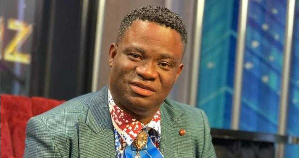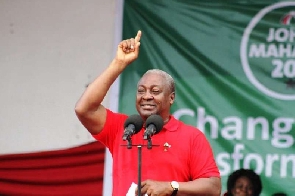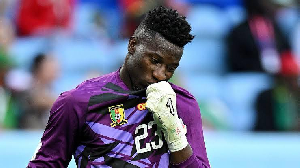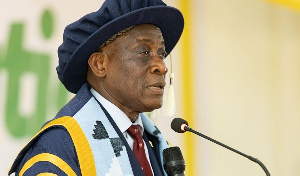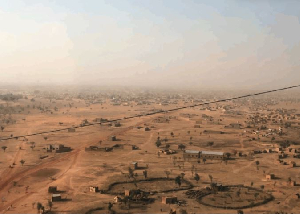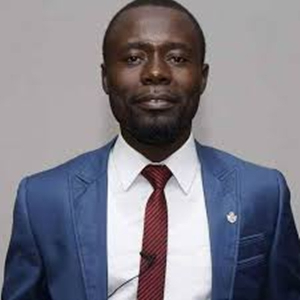The Member of Parliament for Builsa South, Dr. Clement Apaak has sent his best wishes to former President John Dramani Mahama on his 65th birthday.
Dr. Apaak described Mr. Mahama in a brief statement as someone willing to make sacrifices for the greater good.
That, in his opinion, is excellent leadership.
He appealed to God to bless Mr. Mahama, the opposition National Democratic Congress (NDC) presidential candidate.
“Happy birthday Boss. Your willingness to sacrifice for the collective good is exemplary. God keep and guide you always.
As custom demands, I will on behalf of the Builsa people, your playmates, deliver a calabash full of groundnuts to you in recognition of your special day,” his tweet on X read.
Former President John Dramani Mahama was born on the 29th of November 1958 in Damongo, the then capital of the West Gonja District of the Northern Region.
His father, Emmanuel Adama Mahama, a prominent rice farmer was a Member of Parliament for the West Gonja Constituency and the first Regional Commissioner of the Northern Region under Ghana’s first leader, President Kwame Nkrumah.
John Mahama spent the first years of his life with his mother, Abiba Nnaba, in Damongo, before moving to Accra to live with his father, who imbued him with a strong passion for education.
He graduated in 1986 and then went to Moscow, in the former Soviet Union, to the Institute of Social Sciences, where he received a post-graduate degree in Social Psychology in 1988. While in Moscow, he noted the imperfections of the Socialist System and came to the realization that each nation had to find its own transformative way, away from ideological dogmas.
He received his basic education at Achimota Basic School, where he began defending other children from bullies, and later moved to the Ghana Secondary School in Tamale.
Mahama was nominated as running mate to Professor John Evans Atta Mills in 2008 becoming Vice President of Ghana in 2009.
PRESIDENT OF GHANA
In July 2012, he succeeded his boss who passed away on July 24, 2012, and elected in December 2012 as President of Ghana for his first four-year term. He thus made political history by becoming the first Ghanaian head of state to have been born after Ghana’s declaration of independence on 6th March 1957.
While serving as Minister for Communications, John Mahama was also the Chairman of the National Communications Authority and played a key role in the stabilization and transformation of Ghana’s telecom sector.
During his Presidency, Ghana witnessed important transformations, the most important of which was the building of a more vibrant democracy. In 2012, Ghana’s score in the Democracy Index was 6.02, being ranked 78th in the world. In 2016, when he left office, Ghana’s score was 6.75, placing it as 54th in the world – and making it the 5th most democratic country in Africa. During his entire life and throughout his political career, John Mahama has been a champion of the underprivileged, a unifier, moves above tribal politics; a strong supporter of public education for all; and a visionary, seeking to transform Ghana in fundamental ways.
Also under his Presidency, Ghana’s ranking regarding the equality between men and women rose from 71st in the world in 2012 to 59th in the world in 2016.
Equally important, under President Mahama, Ghana’s ranking when it comes to the freedom of the press rose from 41st in 2012 to 26th in 2016, turning Ghana into a world champion of the free press. Unemployment fell from 3.6% in 2012, to 2.3% in 2016. The coefficient of human inequality decreased from 31.9 in 2012, to 28.8 in 2016. Inequality in education fell from 40.9% in 2012, to 34.9% in 2016.
All in all, John Mahama’s Presidency was a truly transformational one.
His book, ‘My First Coup d’État and Other True Stories From the Lost Decades of Africa’, published in July 2012, has won international praise for describing a world of love, fear, faith, despair, loss, longing, and hope despite all else.
He recalls in its first chapter the day in 1966 when he learned of the ousting of Ghana’s founding president, Kwame Nkrumah, in a military coup: “When I look back on my life it’s clear to me that this moment marked the awakening of my consciousness. It changed my life and influenced all the moments that followed.”
He has also written essays, which have been published in the Ebony, Huffington Post, the New York Times and The Root.
Politics of Thursday, 30 November 2023
Source: rainbowradioonline.com
Honest leader who is always willing to sacrifice - Apaak celebrates Mahama's 65th birthday
Entertainment
